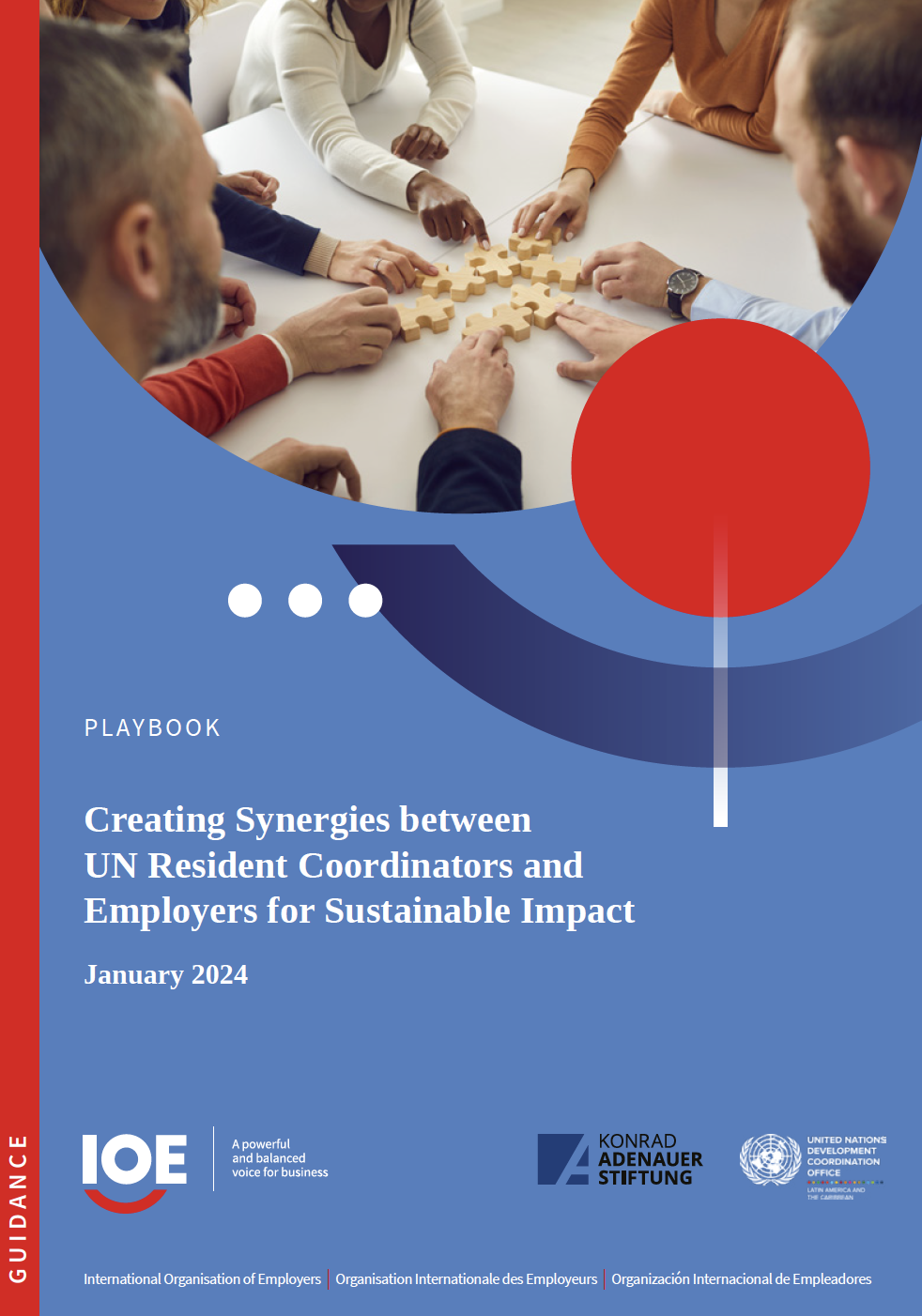Playbook 2.0: Creating Synergies Between United Nations Resident Coordinators and Employers for Sustainable Impact

On Monday, 29 January 2024, Konrad-Adenauer-Stiftung (KAS) and the International Organisation of Employers (IOE) jointly launched the Playbook 2.0 “Creating Synergies between UN Resident Coordinators and Employers for Sustainable Impact” on the sidelines of the 2024 ECOSOC Partnership Forum.
The second edition of the Playbook aims to help UN Resident Coordinators (RCs) and employer organisations foster collaboration and find common solutions on emerging challenges, with a particular focus on policies, digital technologies and innovation. Building on the first KAS-IOE Playbook, developed in collaboration with the UN Development Coordination Office (DCO), the second edition provides new insights and updated best practice for UN and private sector collaborations that guide positive action on the ground.
The discussions underscored the following key takeaways:
- The Playbook supports RCs in fostering a multistakeholder approach by giving a clear understanding on where alignment between the private sector and RCs lies. It is critical that the UN and private sector talk to each other openly on issues of digitalisation, skills, and sustainable social protection. Jobs and sustainable social protection are also reflected as one of the six key transitions identified by the Deputy Secretary-General to move the needle on the SDGs.
- Collaboration between the private sector and RCs will be key to closing the gap in inequality and in achieving the SDGs – in particular, SDG 1 (no poverty), 8 (decent work), and 16 (strong institutions). There is scope for further collaboration to address informality, as an estimated 61 per cent of the world’s working population make their living in the informal economy.
- “RCs are at the forefront of coordinating national development priorities and are key to bringing all actors to the table to achieve common goals.” RCs are key in supporting the coordination with employer organisations at the local level. The Playbook emphasises the importance of effective synergies, collaboration, and partnerships at the local level, and in particular when it comes to engaging local employers on voluntary national reviews (VNRs). The Playbook will also be important in shaping expectations for what the RC role entails.
- “We have to focus on the role that technology can play in creating jobs and meaningful work.“ At least 70 per cent of SDGs could directly benefit from digital solutions. We must ensure that all parts of the digital transformation are brought together in a coherent manner, including through enhanced coordination between RCs and the private sector on digitalisation. This is critical to bringing 2.6 billion people online and connected to the internet.
- “The private sector brings more than financing; they fuel innovation and the acceleration of all SDGs.” The private sector needs to be at the table in the lead-up to major events this year: Including the 3rd UN Conference on Landlocked Developing Countries (LLDCs), the 4th International Conference on Small Island Developing States (SIDS) and the Summit of the Future. The Playbook remains a living document to reflect the rapid changes taking place across societies today.
The Playbook 2.0 and its Executive Summary are available for download.
For further media enquiries please contact: Erica Mumford, Program Manager. (E) erica.mumford [at] kas.de (erica[dot]mumford[at]kas[dot]de)
Originally published by Konrad-Adenauer-Stiftung, Foundation Office New York
Note:
The Joint SDG Fund's joint programmes are under the prestige leadership of the Resident Coordinator Office and implementing United Nations Agencies. With sincere appreciation for the contributions from the European Union and Governments of Belgium, Denmark, Germany, Ireland, Italy, Luxembourg, Monaco, The Netherlands, Norway, Portugal, Republic of Korea, Saudi Arabia, Spain, Sweden, Switzerland and our private sector funding partners, for a transformative movement towards achieving the SDGs by 2030.



















